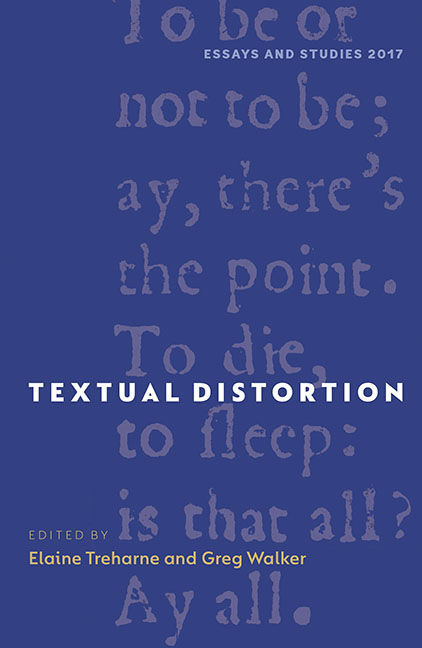Book contents
- Frontmatter
- Dedication
- Contents
- List of Illustrations
- Preface and Acknowledgements
- Notes on Contributors
- Introduction
- The Curious Production and Reconstruction of Oxford, Bodleian Library, Junius 85 and 86
- ‘Through a glass darkly’, or, Rethinking Medieval Materiality: A Tale of Carpets, Screens and Parchment
- Distortion, Ideology, Time: Proletarian Aesthetics in the Work of Lionel Britton
- Shakespeare and Korea: Mutual Remappings
- Dictionary Distortions
- Where Do Indigenous Origin Stories and Empowered Objects Fit into a Literary History of the American Continent?
- Distortion in Textual Object Facsimile Production: A Liability or an Asset?
- The Uncanny Reformation: Revenant Texts and Distorted Time in Henrician England
- The Presence of the Book
- Index
Preface and Acknowledgements
Published online by Cambridge University Press: 24 August 2019
- Frontmatter
- Dedication
- Contents
- List of Illustrations
- Preface and Acknowledgements
- Notes on Contributors
- Introduction
- The Curious Production and Reconstruction of Oxford, Bodleian Library, Junius 85 and 86
- ‘Through a glass darkly’, or, Rethinking Medieval Materiality: A Tale of Carpets, Screens and Parchment
- Distortion, Ideology, Time: Proletarian Aesthetics in the Work of Lionel Britton
- Shakespeare and Korea: Mutual Remappings
- Dictionary Distortions
- Where Do Indigenous Origin Stories and Empowered Objects Fit into a Literary History of the American Continent?
- Distortion in Textual Object Facsimile Production: A Liability or an Asset?
- The Uncanny Reformation: Revenant Texts and Distorted Time in Henrician England
- The Presence of the Book
- Index
Summary
The contributions in this volume of Essays and Studies were inspired by the Stanford Text Technologies Collegium on ‘Distortion’, held in May 2015 at Stanford University. Funded by the Denning Gift, this three-day intensive collegium examined one of the key themes in the history of textual communication: how texts are distorted even as they are disseminated, sometimes as a result of accidental manipulation, or careful mediation; sometimes through wilful perversion or falsification. At the Stanford Collegium, we were delighted to host Benjamin Albritton, Mark Algee-Hewitt, Emma Cayley, Paul Fyfe, Tom O'Donnell, Sarah Ogilvie, Timothy Powell, Colin Reeves-Fortney, Giovanni Scorcioni, Elizabeth Tyler and Greg Walker, and each gave powerful and intellectually stimulating papers on very different topics, centred on the concept and practice of distortion.
We are grateful to be able to include the work of some of these original participants in this book, and other essays we have specifically commissioned for inclusion here. We are pleased to thank the attentive and engaged audience at the Collegium, whose informed questions and focused responses allowed invigorated discussion. We also wish to thank the Dean of Humanities and Sciences at Stanford; the Denning Fund for Humanities and Technology, which supports Text Technologies; the Center for Spatial and Textual Analysis (CESTA), which hosted the Collegium; and Daeyeong Kim, who, as Text Technologies Graduate Administrator, organised the proceedings with great skill and professionalism.
- Type
- Chapter
- Information
- Textual Distortion , pp. xPublisher: Boydell & BrewerPrint publication year: 2017

